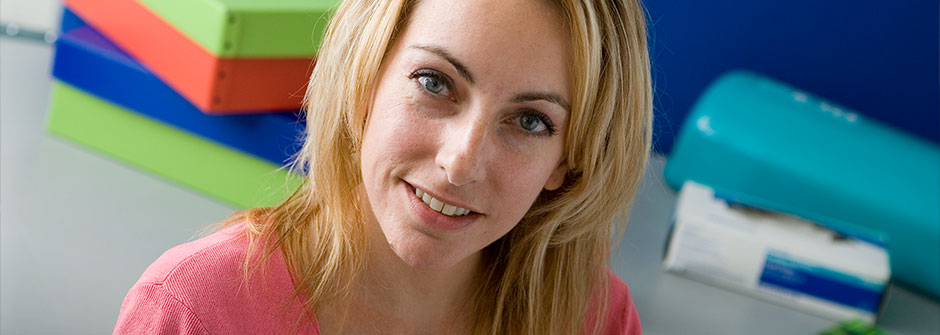
M.S.S.L.P. Curriculum
The comprehensive Master of Science in Speech-Language Pathology (M.S.S.L.P.) program integrates formal classroom instruction and clinical education. The curriculum is assessed at a yearly faculty retreat to ensure that it continues to reflect current theoretical and evidence-based research. Clinical education is reviewed frequently and updated based upon research of current legislative changes, national and state regulatory changes, standards, trends and practices gleaned through continuing education courses, seminars, professional journals, periodicals and other resources.
Course Listing
The following is a list of the courses and clinical experiences that our M.S.S.L.P. students will pursue in each semester of the program. Click on the course title to see a description of the course. For a full description of the courses and additional information about the program, see the Graduate Catalogue.
First Professional Year
Fall Semester (18 credits)
- Physiologic and Acoustic Phonetics
- Diagnostic and Clinical Principles
- Child Language Development and Disorders
- Neuroscience
- Audiology and Aural Rehab from the SLP
- Research Methods 1
Spring Semester (17 credits)
- Speech Intelligibility and its Disorders in Children
- School Age Language and Literacy
- Biomedical Ethics/Prof. Issues SLP
- Acquired Disorders of Language and Cognition
- Dysphagia
- Clinical Practicum/Clinical Seminar
Second Professional Year
Summer Semester (14-15 credits)
- Pediatric Dysphagia and Procedures in Early Intervention
- Fluency Disorders
- Augmentative and Alternative Communication
- Traumatic Brain Injury
- Research Methods II -or- Research Project I
Fall Semester (10 credits)
- Adult Neuromotor Disorders of Communication
- Voice Disorders
- Craniofacial Disorders
- Clinical Practicum/Clinical Seminar II
Spring Semester (5-6 credits)
- Research Project II (if taking Research Project I in the summer)
- Clinical Externship
Clinical Education
Seton Hall University's clinical education model views clinical training as an integral part of the academic program. The clinical education component of the M.S.S.L.P. program is a critical and original aspect of our students' academic program.
Our approach to clinical education, and our varied community partner sites, are what set our program apart from its peers. Dedicated clinical education faculty work with numerous sites in order to place students there for clinical rotations throughout the year. Each of our students has three clinical experiences throughout the course of his or her education. These clinical experiences are aligned with the didactic and clinical course curriculum.
The clinical education model provides multiple opportunities (both controlled and real-life) to:
- acquire domain-specific knowledge and skills;
- assess personal and professional strengths and limitations relative to clinical practice;
- receive multiple levels of feedback from a variety of professionals; and
- practice skills in a safe, effective and appropriate manner and understand the clinical practice context in which those skills are used.
A minimum of 25 observation hours and 375 direct clinical contact hours are required to complete the program. Professors place students in various external sites, starting in the second semester of study. A sample course of rotations is outlined below:
- In the second semester of the program, students are assigned to a school-based clinical site one day per week.
- Students continue at their initial site for three days per week during the second and third semesters.
- In the fourth semester, students start their second placement at a new site, three days per week.
- In the fifth and final semester, students move to their third and final clinical placement, five days per week.
Students spend the first portion of every clinical practicum observing at their clinical site. This experience provides the student with an opportunity to learn about a variety of clinical interactions and procedures without directly participating in patient/client care. Students critically observe their supervisors and thoughtfully reflect on what they encounter. Students begin to participate in direct patient/client care when the supervisor judges that the student has met the following outcomes:
- Students orient themselves to the clinical facility and the caseload at the assigned site.
- Students enhance their clinical observation skills through directed observation tasks.
- Students learn about the role of clinical instrumentation in the delivery of speech-language pathology services.
- Students learn about the connection between research and clinical practice via literature review.
A variety of school- and medical-based settings are available for gaining clinical experience. School-based settings include public schools and specialized schools for children with autism, hearing impairments or multiple disabilities. Medical-based settings include hospitals and outpatient rehabilitation facilities.
All clinical practica are supervised by on-site clinical educators who are ASHA-certified. The Director of Clinical Education (DCE), a full-time faculty member within the Seton Hall Department of Speech-Language Pathology, facilitates the clinical education process by making the placements, overseeing the clinical educational process, developing and administering various experiential training opportunities (ETOs), providing feedback to students and assessing student progress. Furthermore, the DCE provides a seminar/group discussion component alongside the clinical practica to foster individual and group clinical instruction and feedback. Each student receives a site visit by a clinical site visitor (CSV) during each of the three clinical practica. Students, on-site clinical educators, CSVs and DCEs use an online skills tracking software to input data about the clinical rotation, provide feedback and generate reports for assessment purposes.
